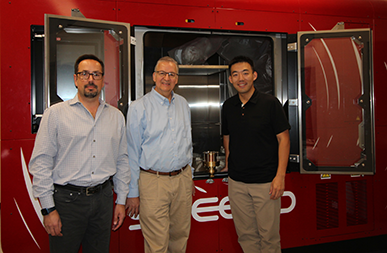Designing Materials for Next-generation Propulsion Systems

UC Irvine researchers awarded multidisciplinary $2 million grant investigating materials for rotating detonation engines
Oct. 8, 2025 - The ability to reliably order groceries or takeout, receive rapid package deliveries, check the weather forecast or navigate with GPS is all part of the United States’ expanding satellite and space economy. The continued growth of this economy depends on advances in propulsion technologies. One such innovation is the rotating detonation engine (RDE), which enables the delivery of satellites into precise orbits with greater reliability and reduced fuel consumption and emissions compared to conventional engines. However, significant scientific challenges remain in designing material systems capable of withstanding the extreme conditions inside RDEs.
Three UC Irvine engineering researchers have been awarded a multi-institutional collaborative grant from the National Science Foundation’s Designing Materials to Revolutionize and Engineer our Future (DMREF) program to address these challenges. Professors Lorenzo Valdevit and Daniel Mumm from the Department of Materials Science and Engineering and Assistant Professor Xian Shi from the Department of Mechanical and Aerospace Engineering, will receive $2 million in funding over four years for their project titled “Thriving While Detonating – Materials for Extreme Dynamic Thermomechanical Performance.” Their team is one of only 25 nationwide selected for funding.
The project brings together collaborators at Lehigh University (PI Natasha Vermaak) and Carnegie Mellon University (co-PI Mohadeseh Taheri-Mousavi). Together, the team will work to develop structural material systems capable of withstanding high-frequency, high-amplitude thermomechanical loads for propulsion and power applications, with a particular focus on rotating detonation engines. The effort also includes partners from the Air Force Research Laboratory (Edwards, WPAFB) and industry stakeholders, who will help translate the developed materials and tools into real-world applications.
The rotating detonation engine is a renowned propulsion concept that generates power by sustaining a circulating detonation wave in an annular chamber traveling at thousands of meters per second. The RDE holds great promise because it can achieve power levels orders of magnitude higher than conventional engines, while offering improved efficiency, more compact designs and higher thrust-to-weight ratios. Despite this potential, the lack of proven materials solutions that can withstand the extreme thermomechanical loads produced by detonations remains a key barrier to deployment. To overcome this, the DMREF team will use an integrated approach that combines experiments, simulations and AI/machine learning to build a deeper understanding of how changes in the composition and microstructure of advanced structural alloys influence damage and failure mechanisms in the RDE environment.

“With myself and Daniel Mumm already working on design and manufacturing of novel thermo-structural alloys, and Xian Shi already building RDE demonstrators, we had the right team in place on our campus to join forces with Lehigh and Carnegie Mellon on this extensive interdisciplinary project,” Valdevit said.
“Among the many challenges facing rotating detonation engines, the materials problem is at the heart of it,” added Shi. “The ability to withstand the extreme conditions these engines create is both the primary bottleneck to their application and a fundamental scientific question — one we are eager to take on.”
The NSF DMREF Program is intended to drive the design, discovery and development of advanced materials needed to address major societal challenges. The DMREF program supports materials design and development through the integration of experiments, computation and data-driven methods, while fostering interdisciplinary collaboration and training the workforce. Since 2012, DMREF has been NSF's primary response to the federal Materials Genome Initiative, whose mission is to discover, develop and deploy new materials twice as fast and at a fraction of the cost of traditional research methods. More information about past and current DMREF projects can be found at dmref.org.
